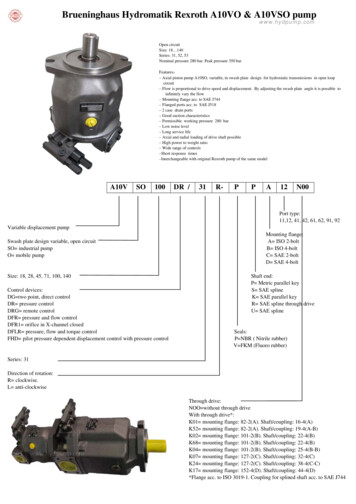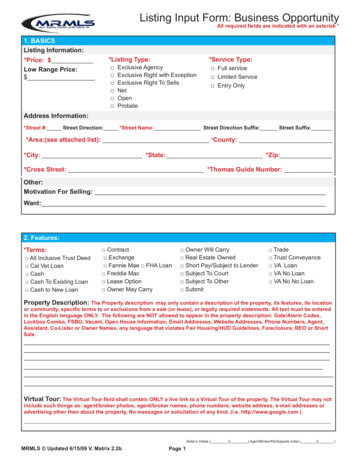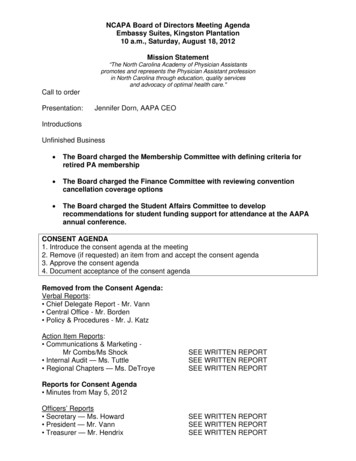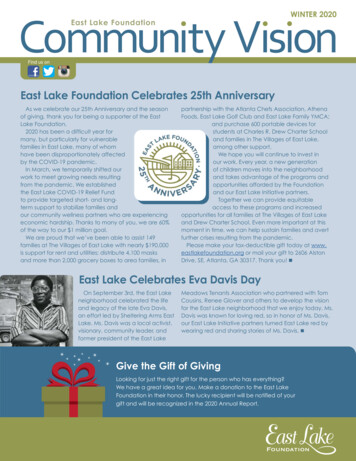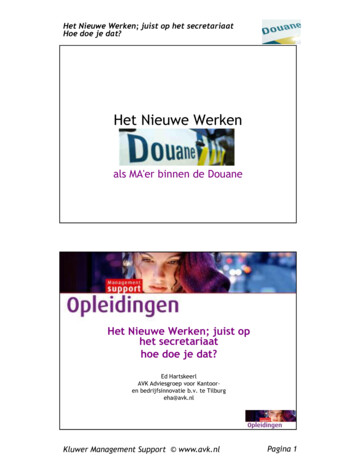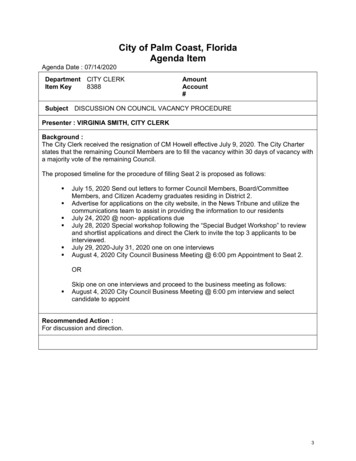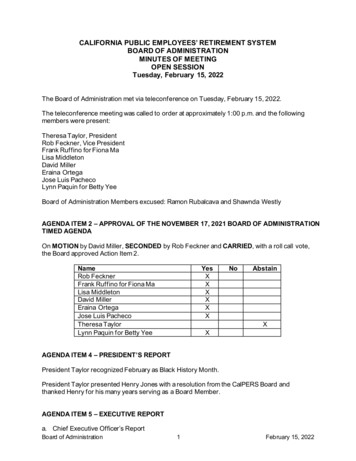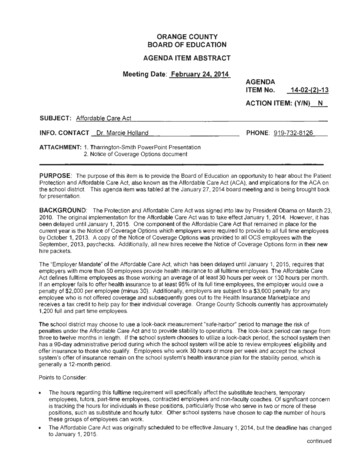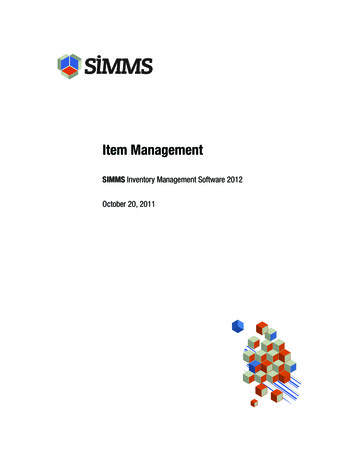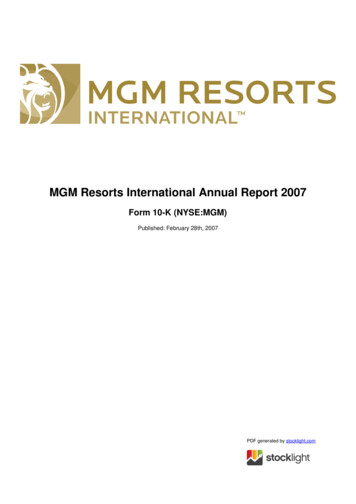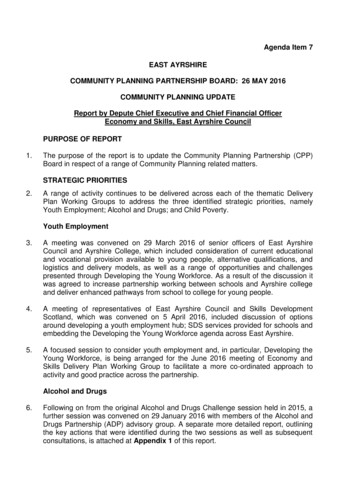
Transcription
Agenda Item 7EAST AYRSHIRECOMMUNITY PLANNING PARTNERSHIP BOARD: 26 MAY 2016COMMUNITY PLANNING UPDATEReport by Depute Chief Executive and Chief Financial OfficerEconomy and Skills, East Ayrshire CouncilPURPOSE OF REPORT1.The purpose of the report is to update the Community Planning Partnership (CPP)Board in respect of a range of Community Planning related matters.STRATEGIC PRIORITIES2.A range of activity continues to be delivered across each of the thematic DeliveryPlan Working Groups to address the three identified strategic priorities, namelyYouth Employment; Alcohol and Drugs; and Child Poverty.Youth Employment3.A meeting was convened on 29 March 2016 of senior officers of East AyrshireCouncil and Ayrshire College, which included consideration of current educationaland vocational provision available to young people, alternative qualifications, andlogistics and delivery models, as well as a range of opportunities and challengespresented through Developing the Young Workforce. As a result of the discussion itwas agreed to increase partnership working between schools and Ayrshire collegeand deliver enhanced pathways from school to college for young people.4.A meeting of representatives of East Ayrshire Council and Skills DevelopmentScotland, which was convened on 5 April 2016, included discussion of optionsaround developing a youth employment hub; SDS services provided for schools andembedding the Developing the Young Workforce agenda across East Ayrshire.5.A focused session to consider youth employment and, in particular, Developing theYoung Workforce, is being arranged for the June 2016 meeting of Economy andSkills Delivery Plan Working Group to facilitate a more co-ordinated approach toactivity and good practice across the partnership.Alcohol and Drugs6.Following on from the original Alcohol and Drugs Challenge session held in 2015, afurther session was convened on 29 January 2016 with members of the Alcohol andDrugs Partnership (ADP) advisory group. A separate more detailed report, outliningthe key actions that were identified during the two sessions as well as subsequentconsultations, is attached at Appendix 1 of this report.
7.In recognition of the continued challenges and the need to support our young people,East Ayrshire Council at its meeting of the 10 March 2016, provided an additional 200,000 for 2 skilled and equipped staff to enable schools to offer greater support inprevention in alcohol and drugs.8.Following discussions at the Executive Officers’ Group meeting of 19 April 2016, itwas agreed that there would be value in charting the current patient journey inrelation to alcohol and drugs services, and identifying what the ideal pathway wouldbe and where key interventions could be improved. It was further agreed toincorporate learning from the current significant case review evidence and carry outa further analysis of past case reviews.9.In addition, it has been agreed that a review of the baseline data relating to alcoholand drugs misuse will be undertaken. Wider consideration will be given to whatimprovement would look like for different groups; the impact of early intervention andprevention measures already implemented; and what different processes and waysof working could be introduced to deliver improvement in relation to this priority.Child Poverty10. On 11 February 2016 the Chief Executive and Policy, Planning and PerformanceManager at East Ayrshire Council met with the Children’s Commissioner to seek hisviews on the content of the draft Child Poverty action plan, as presented to theCommunity Planning Partnership Board at its meeting of 21 January 2016.11. The Commissioner was on the whole content with the proposals contained within theplan, however, emphasised the need for early intervention and for services to focustheir attention on the most vulnerable young people and their families if they aregoing to tackle child poverty. Members of the Executive Officers’ Group have sinceagreed to ensure the effective implementation of the Child Poverty Action Plan, andthis activity will be reported within our broader partnership performance framework.12. In furtherance of our commitment to the Stick Your Labels campaign, the PovertyAlliance was invited to deliver a ‘Stick Your Labels’ awareness raising course to stafffrom the Council’s Policy, Planning and Performance, Communications andOrganisational Development Teams on 21 March 2016. Following on from thesuccess of this session, which challenged a number of current myths about poverty,a further programme of training sessions is now being developed. It is anticipatedthat these sessions, which will be open to staff from across the Partnership, will bedelivered during Summer 2016.13. On 26 April 2016, a ‘Poverty Proofing Our Schools’ working group meeting wasconvened by the Head of Education, East Ayrshire Council. In recognition of thecross cutting nature of this work, the session was attended by key staff from theCouncils’ Schools, Facilities Management, Vibrant Communities, Financial Inclusionand Policy, Planning and Performance teams. A range of operational and strategicactions were identified during this meeting, to progress poverty proofing activity inour schools and wider communities.
COMMUNITY EMPOWERMENT (SCOTLAND) ACT 201514. The Scottish Government has issued, for consultation, the draft guidance on theCommunity Planning related elements of the Community Empowerment (Scotland)Act 2015. CPPs and other stakeholders are invited to provide written comment tothe consultation by 13 June 2016. The consultation materials are available on theScottish Government website.15. The draft guidance is a substantial document which raises a number of issues whichrequire detailed consideration in respect of the potentially significant implications forCommunity Planning Partnerships. Some of the key areas for consideration are asfollows: Collective ownership/leadership:Specific duties on NHS, ScottishEnterprise, Police Scotland, and the Scottish Fire and Rescue Service, as wellas local authorities.Community Participation: Statutory Community Planning Partners mustcontribute such funds, staff and other resources as the CPP considersappropriate to secure participation of community bodies throughoutcommunity planning.Prevention and Early Intervention:Planning prevention and earlyintervention approaches as core CPP activities – and providing resources.Tackling Inequalities: A specific duty on CPPs to act with a view to reducinginequalities of outcome which result from socio-economic disadvantage.Resourcing Improvement: A repeated emphasis on the use of collectiveand sufficient resources to improve outcomes and tackle inequalities.Targeted Approaches: An emphasis on targeted rather than universalapproaches throughout the guidance, on those communities (of place orinterest) or groups where partnership working can have greatest impactLocal Outcome Improvement Plans: To be in place by 1 October 2017.Locality plan(s): To be in place by 1 October 2017.16. Following consultation with members of the Executive Officers’ Group, a draftconsultation response on behalf of East Ayrshire CPP has been prepared. Membersof the Community Planning Partnership Board are invited to give consideration to thedraft response, as attached at Appendix 2 of this report and to approve its finalsubmission to Scottish Government in June 2016.17. With regard to the Locality Planning requirements of the legislation, a ‘mapping’exercise is currently being undertaken in relation to existing locality planningarrangements across East Ayrshire. Research is also being progressed, to identifyexamples of best practice from other areas. The outcome of this research andproposals for an East Ayrshire approach to locality planning will be presented forconsideration at the next meeting of the Executive Officers’ Group, in June 2016.18. Consideration also requires to be given to the current community engagementarrangements which are in place in relation to East Ayrshire CPP, taking account ofthe new Community Empowerment legislation. It is proposed that, subject to Boardapproval, a short term working group be set up to meet during Summer 2016 todevelop a new model of community engagement for Community Planning in East
Ayrshire, in line with the most recent guidance from Scottish Government in respectof Community Empowerment. Members of the Board are also invited to consider thepotential membership of this short term working group and to make nominations inthis regard. It is further proposed that an event is arranged to inform the scope ofactivity undertaken by the working group, with representation from CommunityCouncils, Community Led Action Plan Steering Groups and the Federations ofCommunity Groups. The evening of 28 June 2016 has been identified as a potentialdate for this event.19. In recognition of the complex implications of this new legislation for CPPs, it isproposed that the Policy, Planning and Performance Manager will organise adevelopment event for Community Planning Partnership Board and ExecutiveOfficers’ Group members on the requirements arising from the CommunityEmpowerment Act over the summer period, at a date to be arranged.SCOTTISH GOVERNMENT CONSULTATION: PEOPLE WHO GO MISSING INSCOTLAND20. As members of the Community Planning Partnership Board will recall, the ScottishGovernment has recently consulted on a draft national strategy for people who gomissing in Scotland. As a part of the wider consultation process, the ScottishGovernment’s Safer Communities Directorate is keen to explore opportunities towork with CPPs which are interested in becoming ‘early adopters’ of the strategy’sproposals in order that these can be tested and refined in the coming months. TheChair of East Ayrshire CPP has responded to the Safer Communities Directorate,expressing interest in hearing more about these proposals.21. A meeting has since been convened between the Director of Health and Social Careand the Policy Planning and Performance Manager, East Ayrshire Council, and ithas been decided that the Child Protection Lead Officer and Adult Protection Coordinator will be remitted to progress activity in this area, with future updates to theCPP Board as appropriate.CPP OPERATING ARRANGEMENTS22. As members of the Board will be aware, the Community Planning Partnership Boardhas assumed responsibility for strategic Children’s Service Planning in East Ayrshire.The Board’s Terms of Reference have been updated to reflect this change. Theupdated document is attached at Appendix 3.23. Further updates have also been undertaken to reflect the initial requirements of theCommunity Empowerment (Scotland) Act 2015, with particular reference to the LocalOutcome Improvement Plan and Locality Plans. As the Act is fully enacted over thenext year, and the related guidance for CPPs is finalised, ongoing consideration willrequire to be given to the impact of this new legislation for our partnership, and mayrequire to be further reflected in the Operating Arrangements.24. Finally, the opportunity has also been taken to update the Terms of Reference inrelation to the Board’s new responsibilities under the Community Justice (Scotland)Act 2016 and the arrangements for the appointment of a Chair in the circumstance
where both the Chair and Vice Chair are unable to attend. It is anticipated thatfurther updates will be required to the Terms of Reference as the new governancearrangements for Community Justice are finalised.ANNUAL REPORTING ARRANGEMENTS25. The CPP Board will be aware that the 2015/16 annual performance report willrepresent the first year of reporting against the updated Single Outcome Agreement(SOA) and Community Plan thematic Delivery Plans 2015-18.26. Preparation of the 2015/16 annual performance report has commenced withcirculation of the annual reporting templates to the nominated data/informationproviders for each thematic Delivery Plan. The information provided in these returnswill inform the interim performance report, which will be presented for considerationby the Executive Officers’ Group at its meeting of 28 June 2016. In line withprevious years, the interim report will also be circulated to members of the CPPBoard, to allow early consideration of the indicative 2015/16 performance oversummer. A performance briefing event will also be convened for Board members inadvance of the annual performance engagement event with East Ayrshire Councilscheduled for 22 September 2016.COMMUNITY PLANNING OUTCOMES PROFILE27. The Improvement Service has produced a new Community Planning OutcomesProfile. The profile tool has been made available to CPPs through the on-lineKnowledge Hub, although it is not yet in the wider public domain. It is anticipatedthat the profile will provide a consistent basis for CPP Boards to profile their localarea in relation to common core measures of outcomes and measures of inequalitiesof outcomes, and will offer an overarching, high-level tool to assess whether the livesof communities are improving over time.28. A series of regional learning events will be delivered in June 2016, to introduce theOutcomes Profile. It is hoped that a wide range of partners from each CPP will beable to attend these sessions to share practice and contribute to discussions. Localsessions will take place in Ayr on 10 June 2016 and in Glasgow on 16 June 2016.The profile has been shared at this stage with Community Planning colleagues as a‘soft launch’. During this consultative phase, the Improvement Service will refine theprofile and test out how the information might be used to support decision makingand engagement with local communities.CPP BOARD REVIEW MEETINGS29. To reflect on the operation of the CPP Board during its first year, a series ofindividual meetings have been convened between the Policy, Planning andPerformance Manager and individual Board members. Overall Board members werecontent with the overall strategic direction and operating arrangements for the CPPBoard, however, a number of improvement actions were raised and are summarisedbelow.
Strategic Direction To further support the CPP Board’s strategic leadership role and function, Boardmembers are keen to participate more in shaping the strategic direction, eitherthrough a strategic planning sub-group or by establishing and participating inshort term working groups to consider the CPP Board’s response to nationaland/or local legislation, for example, Community Empowerment Act/CommunityJustice Act. (As a start to these arrangements, proposals have been includedearlier in the report to establish a short term working group to develop a newmodel of community engagement for community planning in East Ayrshire). To ensure a clear focus on the CPP Board’s Strategic priorities. Board memberswere keen to assume a number of roles in this regard, strategic oversight,challenge, lead responsibility and/or mentoring. (These proposals would addstrength to existing arrangements and further consideration will be given to howbest to maximise the impact of this activity).Continuous Improvement In advance of the annual Single Outcome Agreement Performance session inSeptember it was proposed that a dedicated performance briefing session beorganised for CPP Board members. (Session to be arranged for early September2016). Consideration to be given to establishing an audit/performance sub-group.(Further consideration to be given to the most appropriate model for futureaudit/performance).CPP Board Membership The size and overall membership of the CPP Board, although appropriate, wasfelt to be challenging. (As a result of the legislative requirements set out under the CommunityEmpowerment Act it was felt timely that a review of community engagementlinked to community planning be carried out over the summer period).CPP Board Operating Arrangements A number of practical actions were raised and are being implemented, including,name plates for Board meetings, a CPP Board membership biog to be circulatedto all members, the establishment of a CPP newsletter/blog to be issuedroutinely, the Vice Chair to be invited to pre-agenda meetings. Increased engagement, between meetings with the Policy, Planning andPerformance Manager and key strategic leads to be considered. (Furtherconsideration to be given to appropriate models of engagement). Consideration to be given to moving from 3 meetings back to 4 meetings peryear. (Proposal – revert to 4 meetings per annum).CPP Promotion and Marketing A number of Members felt that the CPP should do more to showcase the workbeing carried out across the Partnership. (CP Website is in the process of being
updated, newsletter/blog to be issued routinely. Further consideration to be givento promotional and marketing events/conferences).EXECUTIVE OFFICERS’ GROUP30. Board members are asked to note that the Chair of the Executive Officers’ Grouphas now passed from Fiona Lees, Chief Executive East Ayrshire Council to JohnBurns, Chief Executive of NHS Ayrshire and Arran Health Board with Jim Scott, AreaCommander Scottish Fire and Rescue Service assuming the role of Vice chair.RISK REGISTER31. The CPP Board Risk Register was considered by members of the Executive Officers’Group at its meeting of 19 April 2016. During discussions there was generalagreement that the level of risk associated with reducing budgets should bereviewed to bring it into line with individual agency assessments of this as a ‘high’risk. The Risk Register has been updated to reflect this change, and the reviseddocument is attached at Appendix 4 of this report for members’ consideration andcomment.RECOMMENDATIONS32. The Community Planning Partnership Board is requested to:i)ii)iii)iv)v)vi)vii)vii)ix)x)xi)note the progress update provided in relation to the identified strategicpriorities;note the update provided in respect of the Community Empowerment(Scotland) Act 2015 draft guidance for CPPs;consider and approve for submission to Scottish Government in June 2016 thedraft consultation response attached at Appendix 2;note and approve the proposal to develop a new model of communityengagement for Community Planning in East Ayrshire Summer 2016;consider the potential membership of a short term working group to develop thenew model for community engagement and to make nominations in this regard;consider and approve the proposal for an event to inform the scope of thecommunity engagement working group activity, on the evening of 28 June2016;note the proposal to convene development event for Community PlanningPartnership Board and Executive Officers’ Group members on the requirementsarising from the Community Empowerment Act over the summer period, at adate to be arranged;note the update provided in respect of the People Who Go Missing in Scotlandconsultation;consider and approve the updated CPP Operating Arrangements as presentedat Appendix 3;note the annual performance reporting arrangements for 2015/16, agree toreceive the interim performance report for consideration over the Summer 2016and to participate in a performance briefing session at a date to be arranged;note the update provided in respect of the Improvement Service CommunityPlanning Outcomes Profile;
xii)note and consider the outcome of the individual review sessions held with thePolicy, Planning and Performance Manager, endorse the initial proposals andagree to receive further updates as matters are fully considered;xiii) note the changes to the Chair and Vice chair of the Executive Officers’ Group;xiv) consider and approve the updated CPP risk register presented at Appendix 4;andxv) otherwise, note the content of this report.Alex McPheeDepute Chief Executive and Chief Financial OfficerEconomy and SkillsEast Ayrshire Council18 May 2016
Appendix 1EAST AYRSHIRECOMMUNITY PLANNING PARTNERSHIP BOARD: 26 MAY 2016STRATEGIC PRIORITY: ALCOHOL AND DRUGS UPDATEReport by the Director of Health and Social CarePURPOSE OF REPORT1.To provide the Community Planning Partnership Board with an update on the keyactions identified from the Alcohol and Drugs Challenge Sessions.BACKGROUND2.On 17 August 2015, a multi-agency Challenge Session was convened to considerthe East Ayrshire Community Planning Partnership Board’s identified strategicpriority of alcohol and drug use. A further follow up session was convened on29 January 2016 with members of the Alcohol and Drugs Partnership (ADP) advisorygroup. This report outlines the key issues that were identified during the twosessions as well as the proposed action in response.3.Participants in the challenge sessions included partners, stakeholders and servicesinvolved in or who have an interest in alcohol and drug issues in East Ayrshire andor the impact on communities. People who have experienced drug and/or alcoholproblems were also represented at the sessions.4.During the sessions a number of key themes and areas for action were identified.Whilst some of the actions identified relate to areas of activity already beingprogressed in East Ayrshire, some relate to proposed new activity including makingthe work of the ADP more visible with the support of a communications plan.5.Whilst the sessions identified themes and areas for action, it was also recognisedthat substantial activity is already being undertaken that contributes to the delivery ofoutcomes across the three themes of the community plan. Examples of the activityalready underway is attached at Appendix 1.6.The identified themes and actions have been contextualised and categorised withreference to the outcomes set out within the national strategies for drugs andalcohol, which are as follows: Outcome 1 - People are healthier and experience fewer risks as a result ofalcohol and drug use.Outcome 2 - Fewer adults and children are drinking or using drugs atlevels or patterns that are damaging to themselves or others.Outcome 3 - Individuals are improving their health, well-being and lifechances by recovering from problematic drug and alcohol use.
Outcome 4 - Children and family members of people misusing alcohol anddrugs are safe, well-supported and have improved life-chances.Outcome 5 - Communities and individuals are safe from alcohol and drugrelated offending and anti-social behaviour.Outcome 6 - People live in positive, health-promoting local environmentswhere alcohol and drugs are less readily available.WHAT WE WILL CONTINUE TO DO7.The East Ayrshire Community Plan 2015-2030 and related thematic Delivery planshave identified a number of work streams that will assist in addressing thechallenges presented by the use of alcohol and drugs in East Ayrshire. Thediscussions during the challenge sessions and subsequent consultations confirmeda desire to drive forward additional progress in relation to the undernoted actions.Economy and Skills Provide work placement, employment and training opportunities for those inrecovery (ADP Outcome 3). Influence key statutory services and organisations in East Ayrshirecommunities to provide a range of work placements to assist people inrecovery to develop personal skills, daily routines and confidence for thefuture job market. (ADP Outcome 3). Continue investment in schools and community prevention and educationactivity (ADP Outcome 2).Wellbeing Continue investment in midwifery/maternity provision to ensure that mothersand children can access specialist support to help give them the best start inlife (ADP Outcome 4). Provide support, information and advice on the safer use of alcohol to thegeneral population and targeted areas such as conferences (ADP Outcome1). Offer a range of opiate replacement therapies (ORT) and improve access tothese (ADP Outcome 2).Safer Communities Tackle offending and prevent reoffending (ADP Outcome 5). Increase and expand on engagement with licensing forum and liquorlicensing board (ADP Outcome 6). Tackle stigma relating to people who have alcohol or drugs problems incommunities, making it easier to access support without fear ofembarrassment or judgement (ADP Outcome 3).
WHAT WILL WE DO8.Participants in the challenge sessions also identified a number of priorities wherefurther and additional action is required in order to better address the significantchallenges that drug and alcohol use presents in East Ayrshire. These priorities asbelow: Increasing communications to raise the profile of the work of the ADP and tosupport recovery. Tackling stigma to give people the best chance of recovery and help othersunderstand why people use alcohol and drugs problematically. Increasing employment/training opportunities to build confidence, economyand skills in East Ayrshire. Education and action on alcohol misuse in order to reduce overall risk fromharmful and hazardous use. Reducing instances of unscheduled care by supporting people in theircommunities with a range of interventions. Developing interventions for people in distress who have experienced pasttraumas and are self-medicating with alcohol and drugs as a result.9.These six priority themes have been translated into additional actions. Make better use of social and mainstream media including ‘blogs’ Twitter,Facebook and the local press to raise awareness of recovery(communications). employment/training). Develop and deliver a local recovery festival including service userconference (stigma). Pilot professional screening for drug and alcohol users in police custody aspart of new out of hours service (unscheduled care). Increase opportunities for survivors counselling (trauma and/or mentalhealth). Improve information available to licensing board (harmful and hazardous useof alcohol).10. In recognition of the continued challenges and the need to support our young peoplefurther, East Ayrshire Council at its meeting of the 10 March 2016, provided anadditional 200,000 for 2 skilled and equipped staff to enable schools to offer greatersupport in prevention in alcohol and drugs.RISKS11. The ADP is concerned that a potential reduction in resources available to it will havea significant detrimental impact on activity already being delivered. A recent (2014)report from Public Health England suggests that for every 1 spent on drugtreatment saves 2.50 in costs to society.12. The additional work should potentially see ongoing and continued improvements andperformance against the alcohol and drugs agenda. Less children and young people
are now using drugs and alcohol than ever before. More drug users are now inpositive destinations (education, training and employment) than ever before.13. Over 90% of problem drug and alcohol users continue to receive treatment within3 weeks of referral – the most challenging waiting time standard within the healthsector. However, drug and alcohol problems are multi-facetted and complex andoften arise as a result of global, economic or national political factors and influencesfor example Welfare Reform and Minimum Unit pricing for alcohol.14. RECOMMENDATIONSThe Community Planning Partnership Board is asked to:i)consider the proposals set out above to further tackle the misuse ofalcohol and drugs in East Ayrshire; andii) otherwise, note the content of the report.Eddie FraserDirector of Health and Social Care12 May 2016
Appendix 2Community Planning under the Community Empowerment(Scotland) Act 2015: Consultation on Draft Guidance andRegulationQuestionsQ1: The guidance identifies a series of principles for effective community planning.Do you agree with them? Should there be any others?Please explain why.As a partnership we fully endorse the identified principles of effective communityplanning, which are consistent with the messages from the Christie Commission andare fully reflected in the work of our partnership.We would however take this opportunity to emphasise that as a local partnership werequire flexibility and autonomy from Scottish Government to allow us to respondeffectively to the identified needs of our communities; and to focus on our keypriorities.Central Government also has a key role to play in providing the funding required to‘resource improvement’ and to invest in prevention – at the very least, the nationalperformance management framework must recognise the longer term nature of ourinvestment in prevention and allow this activity to be reflected appropriately inperformance reporting.A streamlined and non-prescriptive national performance framework would alsoassist us to undertake ‘effective performance management’ at a local level.Q2: The draft guidance sets out common long-term performance expectations for allCPPs and community planning partners. Each CPP will adopt its own approachtowards meeting these expectations, reflecting local conditions and priorities. Evenso, do you think there are common short- or medium-term performance expectationswhich every CPP and partner should be expected to meet? If so, what are they?Any national performance framework requires to recognise that investment inprevention and early intervention takes time, possible decades, to make ademonstrable impact.The achievement of some outcomes can only bedemonstrated over the longer term. We would therefore be cautious about shorterterm performance expectations.It is essential that CPPs are given autonomy at a local level to identify and torespond the needs of their own communities. This is particularly important to allowdevelopment of effective Locality Plans – the needs of smaller, more deprived areasor communities of interest may not necessarily reflect those of the wider community,at a local or national level. Delivery must be tailored to local need and performance1
expectations developed to reflect this local context.Any national performance framework also requires to be streamlined and within this,CPPs should be given the autonomy to select and to focus on particular ‘priority’outcomes.There also
26. Preparation of the 2015/16 annual performance report has commenced with circulation of the annual reporting templates to the nominated data/information providers for each thematic Delivery Plan. The information provided in these returns will inform the interim performance report, which will be presented for consideration
